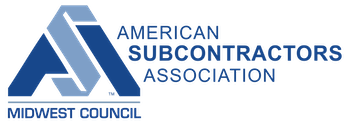Restricted content
ASA Midwest Council is a construction trade association of specialty contractors and suppliers serving the construction industry and the community. Our purpose is to improve the construction process through education, advocacy, and collaboration.
The Tom Owen’s Memorial Scholarship
The Tom Owens Memorial Scholarship Committee seeks funds to provide scholarships for individuals who are entering a college, university, trade school or post graduate school. The fund is a 501c3 charitable organization and contributions can be made at any time. All applications must be received before January 31 and all rules and eligibility requirements must be followed. Scholarships are given on an annual basis and all eligible recipients may receive an award for no more than two years.
Announcements of awards will be publicized before March 1 of the following year. Learn more about the Tom Owens Memorial Scholarship Committee here.
Whistle-Blower Policy
Adopted by The Board of Directors June 21, 2006
The Midwest Council demands the highest ethical conduct from its volunteers, contractors and paid staff, including compliance with all federal, state and local laws and the Association’s own policies and procedures. If any member, contractor or employee is aware of any such breach or potential breach of such law, policy or procedure with respect to the Midwest Council, he/she should bring such problem to the attention of the Association president. If the problem is not resolved after discussion with the Association president or if he/she feels that discussion with the Association president is inappropriate, he/she is encouraged to approach another officer of the Association, Executive Director or Chapter Attorney. The Midwest Council will not tolerate any form of retaliation against an individual who avails him/herself of this procedure. The procedure should not be construed, however, as preventing, limiting or delaying the Association from taking any disciplinary action against any individual, where the Association deems disciplinary action is appropriate.
Conflict of Interest Policies for Board of Directors
Adopted by The Board of Directors August 17, 2005
There exists between the Board of Directors and members of ASA a fiduciary relationship that carries with it a strict and unbending duty of loyalty. Directors are responsible for administering the Association’s affairs honestly and economically, and exercising their best care, skill and judgment for the sole benefit of the Association. The giving of this service, because of the varied interests and backgrounds of the Directors, may result in situations involving a dual interest that might be interpreted as a conflict of interest. However, this service should not be rendered impossible solely by reason of possible conflict of interest.
Potential conflicting interests exist between the Association and any organization or firm with which the Association does business, and between the Association and any organization or firm providing services similar to those services offered by the Association to its chapters, individual members, nonmembers, and other organizations and firms. It is, of course, impossible to list every circumstance giving rise to a possible conflict of interest; however, they may include:
A position of material financial interest in an outside concern from which ASA secures services, goods, or which provides services competitive with ASA;
Any services of a consultative, managerial or directive nature provided to any outside concern that does business with or provides services competitive with ASA;
Any gifts, excessive or unusual entertainment or other favors received from any outside concern that does, is seeking to do business with ASA, or is a competitor of ASA.
If a Director becomes aware that he/she has a possible conflict of interest or that another Director has a possible conflict of interest, he/she should immediately notify the President and the Executive Director. The President and the Executive Director shall review the situation and inform the Board of Directors of a potential conflict of interest situation. The Board of Directors shall obtain an opinion from an outside independent counsel with respect to real or potential conflicts of interest in order to prevent a conflict that could operate to the detriment of the Association.
If the Board of Directors determines that a conflict exists, the Director with the conflicting interest will not be prevented from participating fully in discussions related to the issue or from answering pertinent questions of other Directors. However, the Board of Directors may request the interested Director to abstain from voting on matters related to the conflicting activity or Association. Such vote shall be duly recorded.
This policy will be reviewed annually for the information and guidance of Directors at an annual orientation or at the first Board of Directors’ meeting of the fiscal year. New Directors will be advised of the policy upon election.
Dues and Collections Policy
Fiscal Year is July 1 to June 30.
New Members:
- All potential members applying for membership shall meet the requirements per by-laws.
- All members applying for membership must present membership application and check. An applicant is not a member until payment has been received.
- If a member checks “yes” to the following question, the application must be presented to the board for approval: “Is applicant owned or controlled in whole or in part by a General Contractor, A/E Firm, Construction Manager, Construction Owner or by any individual(s) who are owners or directors of same?
- All new members will pay one full year of dues up front and receive a pro-rated invoice the second year.
- A Change in Membership Form must be sent to National.
- Report the new member on the Dues Summary Report and submit payment before the 15th of the following month.
Renewing Members:
- All renewing members shall receive an invoice for the next fiscal year by May 31.
- Pro-rated invoices for members who joined during the fiscal year will be mailed by May 31.
- Dues invoices will be mailed with a letter from the president.
- All dues invoices and applications must have the amount that is non-deductible due to legislative lobbying activities. This amount shall be given to the ED by the chapter Treasurer.
- When payment is received, ED shall enter the payment in QuickBooks and deposit check.
- A spreadsheet will be kept of all dues collected with their reporting dues summary month.
Collection Policy:
- All invoices must be paid by July 1.
- A past due letter is sent on July 31. Another past due letter is sent on August 31. All members are dropped after September 15 if dues have not been received.
- At the July, August and September board meetings, all unpaid dues are distributed to the board and membership committee. A call list is devised by board members and committee members.
Antitrust Policy
Adopted by The Board of Directors June 21, 2006
A free exchange of ideas on matters of mutual interest to subcontractors, specialty trade contractors, suppliers, general contractors, construction managers, design professionals, and construction owners is necessary for the success of The Midwest Council meetings and activities. However, in carrying on our Association activities and meetings we must be mindful of the antitrust laws. We are a group of competitors. The antitrust laws require that competition be open and unrestricted.
The antitrust laws forbid agreements or joint actions which by intention, or by their effect whatever the intention, restrain trade.
Agreements or joint actions which can restrain trade, and thus must be avoided, include:
- Anything regarding price, or any terms of sale.
- Restrictions regarding production, territories, markets, customers, contract terms or products.
- Refusals to deal with competitors or others in any part of the industry.
- Limitations on access to the industry and the market and its mechanisms.
In formal meetings, informal sessions, and in casual conversations, and in written documents, it is very important to avoid the subjects mentioned above. An “agreement” among trade association members in antitrust terms in a very broad concept – it may be oral or written, formal or informal, expressed or implied. A “gentlemen’s agreement” to “hold the line” on price or contract terms is more than sufficient to evidence of an unlawful conspiracy to fix prices.
It is important to adhere to the prepared written agendas in meetings.
Antitrust compliance is a continuous necessity, and a day to day endeavor. If at any time you have any question from the trade restraint standpoint, please confer with The Midwest Council counsel.
Code of Conduct Policy
Code of Conduct Policy
Adopted by The Board of Directors June 21, 2006
The Midwest Council is a not-for-profit organization dedicated to representing the construction industry through advocacy, leadership, education and networking. The Midwest Council traditionally has demanded and received the highest ethical services from its volunteers and paid staff. In an effort to maintain the high standard of conduct expected of the Midwest Council with respect to the management of its own affairs and to enable the Midwest Council to continue to serve the construction industry, the Midwest Council adopts the following Code of Conduct applicable to all volunteers and paid staff.
- The Midwest Council volunteers and paid staff shall strive to be continually aware of the Association’s mission, values, and ethical standards and operate in a manner consistent with them.
- The Midwest Council volunteers and paid staff shall treat each person in a caring and respectful fashion mindful of individual differences and cultural and ethnic diversity. This includes avoiding unwarranted negative criticism of colleagues.
- The Midwest Council volunteers and paid staff shall continually strive to increase their professional knowledge and skills and apply them in practice. They should aspire to contribute to the knowledge base of the Association and the construction industry.
- The Midwest Council volunteers and paid staff should be alert to and avoid conflicts of interest that interfere with impartial judgment. They should inform appropriate leadership (i.e., officer or senior staff) when a real or potential conflict of interest arises and take reasonable steps to resolve the issue.
- The Midwest Council volunteers and paid staff shall not accept or seek on behalf of any person, any financial advantage or gain of other than nominal value offered as a result of the volunteer or paid staff member’s affiliation with The Midwest Council.
- The Midwest Council volunteers and paid staff should provide services and represent themselves as competent only within the boundaries of their education, experience, training, or other relevant professional experience.
- The Midwest Council volunteers and paid staff shall not disclose any confidential Midwest Council information that is available solely as a result of the volunteers or paid staff member’s affiliation with The Midwest Council to any person not authorized to receive such information or use to the disadvantage of The Midwest Council any such confidential information.
- The Midwest Council volunteers and paid staff shall not authorize the use of or use for the benefit or advantage of any person, the name, logo, endorsement, services or property of The Midwest Council, except in conformance with Association procedures.
- The Midwest Council volunteers and paid staff should not take unfair advantage of their affiliation with The Midwest Council to further their personal, religious, political or business interests.
- The Midwest Council volunteers and paid staff shall strive to operate and act in ways that are in the best interests of The Midwest Council and its members.
- The Midwest Council volunteers and paid staff shall not operate or act in any manner that is contrary to the best interests of The Midwest Council.
- The Midwest Council volunteers and paid staff shall fully comply with all laws, rules and regulations applicable to the Association in the locations in which it operates.
Equal Employment Opportunity and Anti-Discrimination Policy
Adopted May 21, 2008
A. Statement of Policy. The Association provides equal employment opportunities to each employee and applicant for employment without regard to race, color, religion, national origin, ancestry, age, sex, marital status, handicap or disability, unfavorable discharge from military service, status as a Vietnam-era or special disabled veteran, or citizenship status in accordance with applicable law. This policy applies to all terms and conditions of employment, including, but not limited to, hiring, placement, promotion, termination, layoff, recall, transfer, leaves of absence, compensation and training.
B. Prohibition Against Unlawful Harassment. The Association expressly prohibits any form of unlawful employee harassment based on race, color, religion, national origin, ancestry, age, sex, marital status, handicap or disability, unfavorable discharge from military service, status as a Vietnam-era or special disabled veteran, or citizenship status in accordance with applicable law.
C. Specific Policy on Sexual Harassment. With respect to sexual harassment, the Association prohibits:
- Unwelcome sexual advances; requests for sexual favors; and all other verbal or physical conduct of a sexual or otherwise offensive nature, especially where:
a. Submission to such conduct is made either explicitly or implicitly a term or condition of employment,
b. Submission to or rejection of such conduct is used as the basis for decisions affecting an individual’ s employment, or
c. Such conduct has the purpose or effect of creating an intimidating, hostile, or offensive working environment; - Offensive comments, jokes, innuendos and other sexually oriented statements.
D. Complaint Procedure. An employee who believes she/he has experienced any harassment based upon race, color, religion, sex, sexual orientation, national origin, ancestry, age, marital status, handicap or disability, unfavorable discharge from military service, or status as a Vietnam-era or special disabled veteran or who believe they have been treated in an unlawful, discriminatory manner, should promptly report the matter to the President of the Association for investigation or if to do so would be in appropriate, to the Vice President of the Association. The Association promptly will conduct a thorough, objective investigation of the complaint and attempt to resolve the situation. If the Association determines that unlawful discrimination has occurred, the Association will take appropriate action. The Association will not tolerate any retaliation against an employee for filing a complaint in good faith.
American Subcontractors Association – Midwest Council
ASA Midwest Council is a construction trade association of specialty contractors and suppliers serving the construction industry and the community.
Our purpose is to improve the construction process through education, advocacy, and collaboration.
©2025


